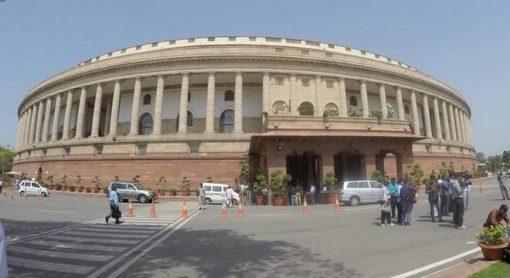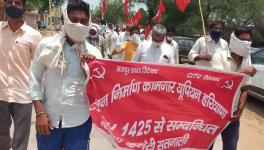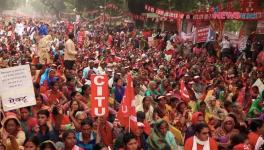Parliamentary Panel Object to Exclusion of Charitable Trusts Running Big Businesses from IR Code

New Delhi: A parliamentary committee has raised serious objections to the exclusion of all charitable and social organisations from the purview of the definition of ‘industry’ evn as many such institutions, including educational entities, are running big business empires engaging thousands of workers.
The Standing Committee of Labour and Employment Ministry, in its report on the Industrial Relations (IR) Code, 2019, has exhorted the Ministry to revisit the provisions and make suitable amendments with particular reference to the Educational Institutions managed by Charitable Trusts but indulging in profit-making business ventures.
The Bhartruhari Mahtab-led committee submitted its report to the Lok Sabha Speaker on April 23. It noted that under the Industrial Disputes Act, 1947, institutions owned or managed by organisations wholly or substantially engaged in any charitable, social or philanthropic services, are covered under the definition of industry. However, the IR Code proposes to exempt such institutions including educational institutions managed by charitable trusts.
Expressing its anguish, the panel observed that it is not "impressed with the contention of the Ministry for excluding these institutions from the purview of the definition of Industry as it is a well known fact that some of such institutions including educational entities have established big business empires engaging thousands of workers”.
Moreover, the committee noted that the words "substantially engaged in any charitable, social or philanthropic service" are ambiguous which can lead to many interpretations.
It is equally intriguing to exempt the institutions which have been established without any profit motive as there is no robust mechanism available with the government to ensure that after establishment, some of these institutions do not indulge in commercial activities, the report stated.
The committee, therefore, has urged the Ministry to revisit the clause and make suitable amendments therein with particular reference to the educational institutions managed by charitable trusts but indulging in various profit-making business ventures.
The Industrial Relations Code, 2019 proposes to bring transparency and accountability in the enforcement of labour laws which would lead to better industrial relations and thus higher productivity. The ease of compliance of labour laws would promote setting up of more enterprises, thus catalysing the creation of ample employment opportunities in the Country.
The Industrial Relations Code, 2019 was introduced in the Lok Sabha on November 28, 2019 and was referred to the committee on December 23 for examination and submitting a report.
Opining that governance of the industrial relations system is simply not about framing good laws but also designing adequate and effective mechanisms for their efficient implementation, the committee has pressed upon the government to strive for creating a formal and conducive industrial relations system so as to ensure economic progress, employment generation and labour welfare.
Taking note of the fact that the difference between the definitions of 'employee' and ‘worker' has led to much perplexity and befuddlement, the committee has recommended that wherever the two words have been separately referred to in the Code, only word 'employee', be used or both the terms should coexist everywhere so as to ensure uniform applicability of the labour laws to the employee/worker.
Expressing serious apprehensions about the ambiguous definition of 'Fixed Term Employment', which may be used to replace the present and permanent vacancies into a flexible contract or regular basis, the committee has urged the government to incorporate protective and pre-emptive provisions explicitly mentioning the conditions under which and the areas where the employers can secure FTE from a designated authority so as to dispel any sort of misgivings and misinterpretation.
Expressing a firm view that the unorganised sector deserves a special attention and mention in the Code itself, the committee has recommended that an exclusive chapter be dedicated in the IR Code in favour of the workers engaged in unorganised sector including the agricultural workers so as to appropriately address a number of issues besetting such workers/sector.
Observing ambiguities in the relevant Clauses which deal with recognition of Trade Unions at the Central and State levels and in view of the significance of the prescription of clear procedures for the recognition of the Trade Unions, the committee has impressed upon the Ministry to bring in clarity so as to appropriately recognise and prudently involve the Trade Unions in all industrial activities with responsibilities and liabilities.
In addition, expressing surprise at the retention of a provision in the Code regarding empowering the appropriate government or the central government to make an order rejecting or modifying an award given by the Tribunal, despite a similar provision contained in the ID Act, 1947 being struck down by the Andhra Pradesh and Madras High Courts, the committee has urged the Ministry to delete the said provision which is unconstitutional and violative of the avowed principles of Separation of Powers.
Appreciating the introduction of a new concept called 'Workers Re-skilling Fund' which stipulates the employer's liability to pay wages for 15 days to the workers who are retrenched or who lose employment on account of the closure of the establishment, the committee has, however, desired that such these wages be enhanced to 30 days and made applicable only in case of retrenchment, as its applicability to closure too would be an unwarranted additional burden on the employer and unfair to him.
Arun Kumar Das is Delhi-based journalist and can be contacted at akdas2005@gmail.com. Views are personal.
Also read: Railways’ Sluggish Run Continues with Diminished Services Amid Extended COVID-19 Lockdown
Get the latest reports & analysis with people's perspective on Protests, movements & deep analytical videos, discussions of the current affairs in your Telegram app. Subscribe to NewsClick's Telegram channel & get Real-Time updates on stories, as they get published on our website.
























